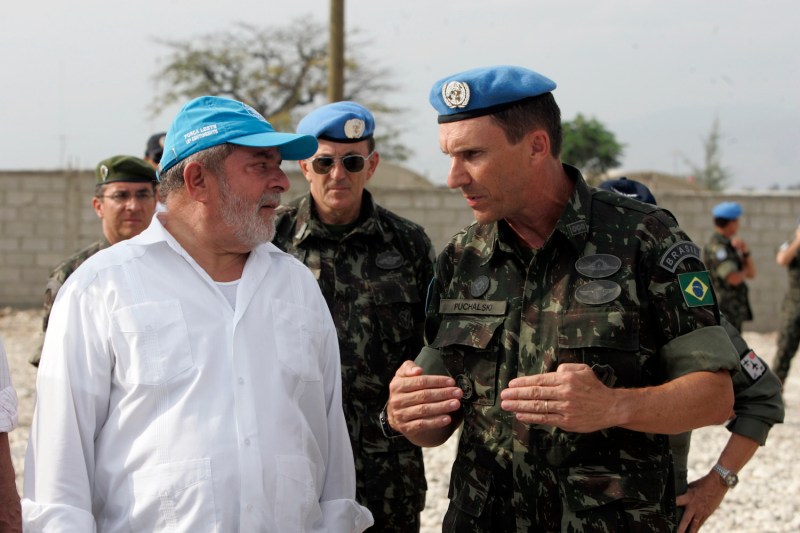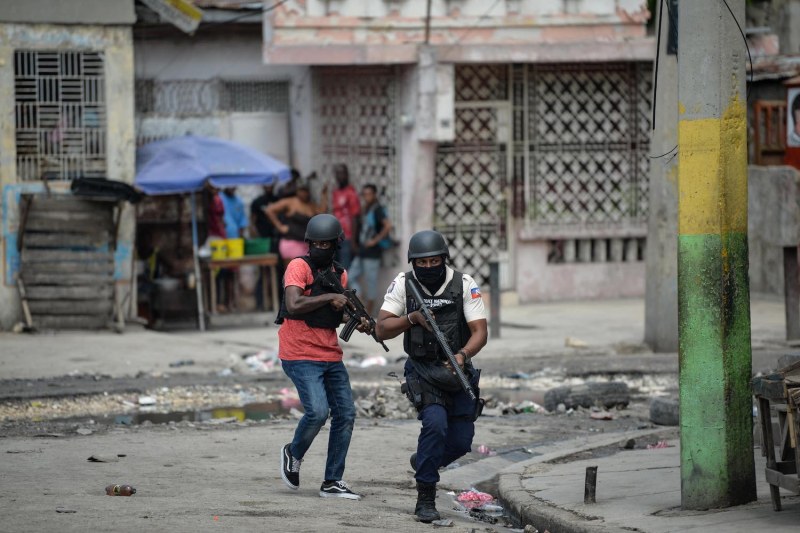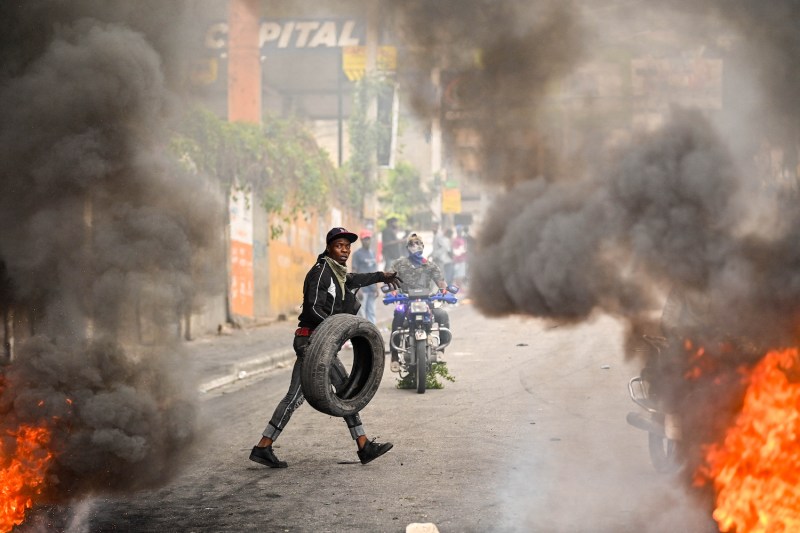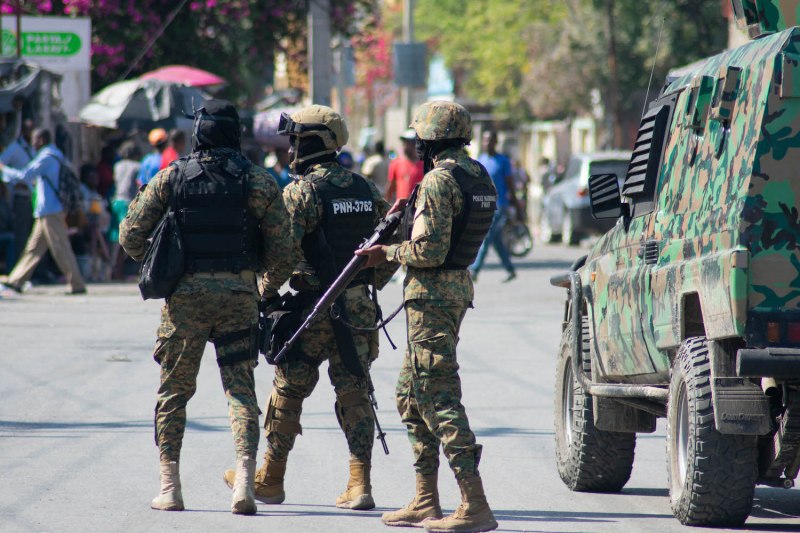Why Lula Is Silent on Haiti
Brazil’s earlier intervention not only failed to secure the Caribbean nation—it is also linked to Bolsonaro’s militarization of government.
Haiti is on the verge of political collapse. As the country’s security situation deteriorates, the international community is debating whether and how to step in. One government that played a key role in Haiti over the past two decades has taken a conspicuous back seat.
Haiti is on the verge of political collapse. As the country’s security situation deteriorates, the international community is debating whether and how to step in. One government that played a key role in Haiti over the past two decades has taken a conspicuous back seat.
From 2004 to 2017, Brazil led the military component of the United Nations-backed peacekeeping mission to Haiti known as MINUSTAH. Since the U.N. Security Council authorized a new mission to Haiti last October, however, Brasília has been shy about supporting the operation. Brazil has offered to train Haitian police forces, but it has declined multiple requests from both the United States and United Nations to provide forces or financing for a new mission.
Brazilian President Luiz Inácio Lula da Silva’s reluctance to play a more active role in Haiti today stands in stark contrast to his assertive stance 20 years ago. In 2004, Lula, then recently elected to his first term in office, was eager to project himself as a leading voice of the global south. As part of that effort, he sought to demonstrate that Brazil could be a purveyor of global public goods, in this case peace and security.
MINUSTAH was established in 2004 following a revolt against then-Haitian President Jean-Bertrand Aristide. Its stated goal was to help Haiti’s transitional government ensure “a secure and stable environment” by quelling violence, especially in areas controlled by armed gangs, and strengthening the capacity of Haiti’s police force. Lula saw the intervention as a unique opportunity for Brasília’s growing geopolitical ambitions. The Brazilian Foreign Ministry described Haiti’s crisis at the time as a Latin American problem; then-Foreign Minister Celso Amorim said regional countries should take the lead in preventing Haiti from becoming a “narco state.” A total of 37,000 Brazilian troops served in 26 rotating contingents over MINUSTAH’s 13 years. Never before had Brazil taken on such a significant responsibility in U.N. peacekeeping.
At the time, the Brazilian government insisted it was particularly well-suited to operate in Haiti. Brazil lacked an imperial past or history of intervention in the Caribbean, officials noted, and, like Haiti, it was also a developing country. “Brazil’s approach is better than using guns and bombs,” Lula said in 2005. Augusto Heleno, the general in charge of MINUSTAH in its early years, argued, “We are not an occupation force. … We refuse to use blind violence. We are a force for peace.” A report co-published by the Brazilian Armed Forces in 2017 said MINUSTAH had become “a global reference” for peacekeeping missions. In the same volume, former force commander Floriano Peixoto wrote that Brazil’s 13-year military presence in Haiti could be, “without a doubt, considered a very successful epic.”
Last year, when Lula returned to the presidential palace, he argued that “Brazil is back” on the global stage. Since then, he has taken countless international trips. His frequent—and sometimes controversial—comments about the biggest geopolitical challenges of our time reflect how serious the president is about turning Brazil into a more visible global actor. There is nothing Lula desires more than reforming the U.N. Security Council, of which Brazil would like to become a permanent member.
Assuming an assertive role in attempts to stabilize Haiti would seem like an opportunity for Lula to prove Brazil’s mettle as an emerging power. Unlike its role as a bystander to the wars in Ukraine and Gaza, Brazil seems to have the capacity to make a difference in Haiti. It would have the space to do so, too: The United States and France each have troubled imperial legacies in Haiti and are reluctant to get directly involved in the country again.
Being part of another mission to Haiti could also—at least in theory—substantiate Brazil’s claims to be a leader of the global south. Developing countries are at the forefront of the new U.N.-authorized mission to Haiti. Kenya promised to lead the operation, though it has paused deployment until Haiti appoints a transitional government. The intervention will be far more modest than MINUSTAH, sending police officers rather than soldiers. Benin, Belize, Jamaica, and the Bahamas have signaled their willingness to provide forces. Guyana, the United States, Canada, and the European Union pledged financial resources. Brazil has a wealth of knowledge from its 2004 to 2017 mission in Haiti that it could share with these actors.
Yet several reasons explain Brazil’s reluctance to get involved in Haiti again.
First, despite the Brazilian government’s rosy official rhetoric about MINUSTAH’s legacy, the operation today is largely regarded as a disaster. Not only did the mission fail to stabilize Haiti beyond 2017, but it also increased Haitians’ suffering. U.N.-backed soldiers were involved in a 2005 massacre in the Cité Soleil slum. U.N. forces have been accused of rampant sexual abuse of Haitian civilians, including children; there are hundreds of “MINUSTAH babies” fathered by U.N. peacekeepers (though they are not all necessarily the product of rape). The U.N. presence also triggered a cholera outbreak that killed at least 9,000 people. Only after six years did the U.N. take responsibility for the epidemic. According to a 2019 investigation by Folha de São Paulo, both the United Nations and Brazil’s Ministry of Defense recognized Brazilian peacekeepers were ill-prepared to protect Haitian civilians’ human rights.
Second, the dominant perception in Brasília today is that Haiti’s problems cannot be solved by an international police presence. Numerous experts share this assessment. As Alexander Causwell of the Caribbean Policy Research Institute argued in Foreign Policy, Haiti faces a full-blown insurgency, not a mere gang problem. Rasheed Griffith, a Barbadian analyst, told FP’s Catherine Osborn that “no police force from Kenya is going to make a difference” and that resolving Haiti’s security crisis would require “quite a substantial military activity.” This suggests a high risk of casualties both among Haitian civilians and foreign forces—whether they are police or military troops.
Brazilian officials never fully embraced the optimistic Western narrative of foreign intervention and so-called nation-building in the early post-Cold War years. But in 2004, they were more confident about the international community’s capacity to bring stability to troubled countries than they are today. (Brazilian U.N. official Sergio Vieira de Mello’s efforts in East Timor are a case in point.) Today, even the most enthusiastic fan of nation-building has few illusions about what outside intervention can achieve. Brazil knows from its past intervention in Haiti that peace missions face broad rejection from locals—and that the risk of becoming embroiled in controversy and human rights violations is high.
This is aggravated by the perception that the United States bears some responsibility for the crisis in Haiti. Washington backed de facto Haitian Prime Minister Ariel Henry—an unelected leader whose lack of legitimacy has contributed to the country’s turmoil. Former U.S. Ambassador to Haiti James Foley recently called Haiti’s crisis the “fruit of the choices we made.” Brasília may be unwilling to undo the damage Washington caused.
Third, Brazil is less exposed to the consequences of continued chaos in Haiti than countries like the United States, which is the top destination for Haitian migrants. While over 700,000 Haitians reside in the United States, the number of Haitians in Brazil is far lower, at around 160,000 people. The number of recent Haitian arrivals to Brazil is so low that the crisis barely figures on the public radar and media coverage.
The Biden administration may be keen to stabilize Haiti to reduce the number of migrants arriving in the United States; Lula has no such political incentives to send troops to Haiti. On the contrary: Since MINUSTAH is largely seen to have been a failure, resurrecting it risks becoming a costly distraction from Lula’s other foreign-policy priorities, such as hosting a successful G-20 summit as the bloc’s president this year. Generally, the Caribbean is not seen as crucial to Brazil’s strategic interests.
Fourth, Brazil faces more than enough of its own challenges. The Lula government deployed troops to ports and airports in São Paulo and Rio de Janeiro in late 2023 due to a rise in domestic insecurity and smuggling driven by transnational crime, and it is currently considering expanding the operation to ports in other parts of the country. In 2018, Brazil declined a U.N. request to take a leading role in a peacekeeping mission to the Central African Republic to concentrate on a federal military intervention against drug cartels in Rio de Janeiro.
Finally, and most importantly, Brazil’s capacity to contribute to international security challenges is limited by fraught civil-military relations. Recent reporting and judicial investigations have reminded the public of some anti-democratic currents within Brazil’s military establishment. These include a failed attempt by allies of former President Jair Bolsonaro to stage a military coup to prevent Lula from taking office after Brazil’s October 2022 election. Lula now faces the difficult balancing act of punishing the coup plotters without undermining his efforts to rebuild trust with the barracks. Sending a large contingent of Brazilian soldiers or police officers to Haiti could be unnecessarily risky.
There is an important detail to the MINUSTAH operation that few international observers are aware of: Numerous leading Brazilian military officers who served in Haiti later joined the Bolsonaro government.
Among them is Augusto Heleno, who would become secretary of institutional security (akin to national security advisor) under Bolsonaro and who appears to have been one of the leading coup-mongers in 2022, according to recent revelations. Three further former MINUSTAH force commanders—Luiz Eduardo Ramos, Carlos Alberto dos Santos Cruz, and Peixoto—became ministers under Bolsonaro. Edson Pujol, who led MINUSTAH between March 2013 and March 2014, became head of the Brazilian Army under Bolsonaro. Three others—Fernando Azevedo, Tarcísio Freitas, and Otávio Rêgo Barros—were part of the mission in Haiti and then joined Bolsonaro in top government positions.
These men were key figures in the militarization of the Bolsonaro administration. Bolsonaro appointed more than 6,000 military officers to roles in his government, muddying the boundaries between the armed forces and civilians to an unprecedented degree since the end of Brazil’s dictatorship 40 years ago.
Lula would be forgiven for thinking of MINUSTAH as a far-right breeding ground. During the 2018 presidential campaign, then-candidate Bolsonaro cited Brazil’s actions in Haiti as an example of what his public security policy would look like. Defending impunity for police officers who kill criminals, he said, “[w]e, in Haiti, had a form of engagement: the military would shoot anyone [in possession of a large] weapon—with 10, 15, 20, 50 shots—and then see what happened. The problem was resolved quickly.”
All this explains why Brazil is so reluctant to get involved in peacekeeping in Haiti this time around. Lula’s government sees Brazil’s 2004 to 2017 intervention in Haiti as a double defeat: Not only did MINUSTAH fail to stabilize Haiti, but it also seems to have created close bonds between a group of military officers, some of whom would, just five years after the mission’s end, come dangerously close to staging a coup at home.
Oliver Stuenkel is an associate professor of international relations at the Getulio Vargas Foundation in São Paulo. Twitter: @OliverStuenkel
More from Foreign Policy

Europe Alone
Nine thinkers on the continent’s future without America’s embrace.

Why Can’t the U.S. Navy and Its Allies Stop the Houthis?
Months of intense Western naval operations have failed to secure the Red Sea.

Trump’s Return Would Transform Europe
Without Washington’s embrace, the continent could revert to an anarchic and illiberal past.

Who’s in Charge of the IDF?
Evidence is growing of a command and control problem.








Join the Conversation
Commenting on this and other recent articles is just one benefit of a Foreign Policy subscription.
Already a subscriber? .
Subscribe Subscribe
View Comments
Join the Conversation
Join the conversation on this and other recent Foreign Policy articles when you subscribe now.
Subscribe Subscribe
Not your account?
View Comments
Join the Conversation
Please follow our comment guidelines, stay on topic, and be civil, courteous, and respectful of others’ beliefs.